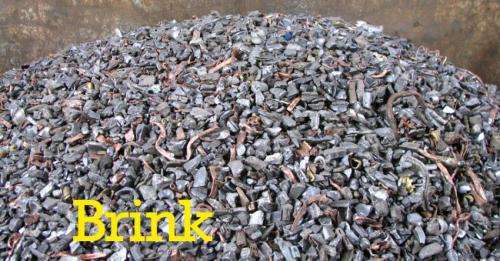Making wealth from waste

We have killed for it, enslaved others to mine for it, and even built a world currency based on it. Gold. Homer described it as the glory of the immortals. The Incas simply called it the tears of the sun.
Despite gold's long association with wealth and culture, many of us discard this precious metal with barely a second thought. Every year, we ditch millions of mobile phones when we buy a new model, throwing the old phones into bottom drawers or, worse, chucking them in the bin. With them goes gold and other precious metals used to make a phone's circuitry.
It's a phenomenal waste when you consider that the two grams of gold needed to produce one wedding ring could be extracted from just 10 kilograms of mobile phones. In comparison, you would need 10 tonnes of ore to extract the same amount of gold.
It is a level of waste that is replicated down the periodic table: the copper, silver, gold, palladium and a host of other rare metals found in electronic waste, for example, are increasingly ending up in landfill. According to the Australian Bureau of Statistics, by 2008, Australians – one of the highest waste-producing nations on a per capita basis – had already sent about 17 million televisions and 37 million computers to landfill.
But it doesn't have to be so. What if we could unlock the wealth buried in all that waste? What if our waste depots could become the new urban mines?
A new collaborative research group that brings together cutting-edge researchers and industry partners from around Australia and overseas is exploring just that. Wealth from Waste is a three-year, $9 million research program that will identify viable options to "mine" above-ground resources, such as the metals contained in discarded manufactured products and consumer goods.
There are two main reasons we should recycle metal waste, says researcher Dr Damien Giurco from the Institute for Sustainable Futures at the University of Technology, Sydney (UTS). "There is money in recycling and it is good for the environment," he says.
Dr Giurco, who is leading the CSIRO-funded collaboration, says that for most metals, there is a much lower environmental footprint from recycling than from mining. But Australia risks missing out on a plethora of new and more sustainable business opportunities by ignoring the benefits of recycling metals.
"Waste is definitely on the policy agenda in Australia but metals are not at the heart of that," he says.
"But recovery of metals is at the heart of international considerations about waste and it is important that we are not left behind. It will be technology and business models that underpin accessing the value in waste material and we need to be part of that."
More than $2 billion is lost to the Australian economy every year from failure to recycle waste metals, according to research by the Wealth from Waste team, a collaboration that includes Monash University, the University of Queensland, Swinburne University of Technology and Yale University in the US.
"We've found that recovering the five million tonnes of metal such as iron, aluminium and copper locked up in landfills or discarded products could provide up to 70 per cent of Australia's metal consumption each year," Dr Giurco says.
E-waste is a prime example of the opportunities going begging. In Australia, it is the fastest growing waste stream , with only about 10 per cent of old TVs, DVDs, computers and other electrical goods recovered or recycled.
But in what is a challenging time for many sectors of the economy, unlocking the potential of the so-called circular economy will ensure Australian companies retain their competitive advantage, says Suzanne Benn, Professor of Sustainable Enterprise at the UTS Business School.
"In a circular economy, the re-use and remanufacturing of products becomes standard practice, so that companies start to close the loop on their daily operations," she says.
In the circular economy, products are not only recycled, they are designed so they can be easily repaired and upgraded, reused or resold, thereby recycling the material in them many times over. (For more on the circular economy, see page X).
Changing business and government attitudes about waste and recycling won't be so easy. There has been little pressure to recycle, in part because Australia's large supply of landfill sites has suppressed the cost of waste disposal. Unlike in Europe, where recycling rates are much higher, it doesn't cost much just to bury our rubbish. And, Australia's large resources market means few are worried about the security of the supply of metal and minerals. Mostly, we just dig it up.
Another problem could be economies of scale. Critics say there is not enough scrap in Australia to make recycling viable but the Wealth from Waste team says new technology, such as 3D printing, could change that.
The team will concentrate on the kinds of innovation and business models that could create and capture resource value in material chains. That could be anything from manufacturers "leasing" metals rather than buying them, to companies collaborating with their neighbours on the supply chain to minimise metal waste.
Mining industry expertise could play a key role in working out the best ways to extract metals from finished products, says Dr Giurco. He points to Swedish company Boliden as a company that both mines and recycles metals.
"They are a miner and a massive recycler and they are making money out of it. That has not been the trend in Australia where our mining companies concentrate on ore extraction."
Provided by University of Technology, Sydney

















